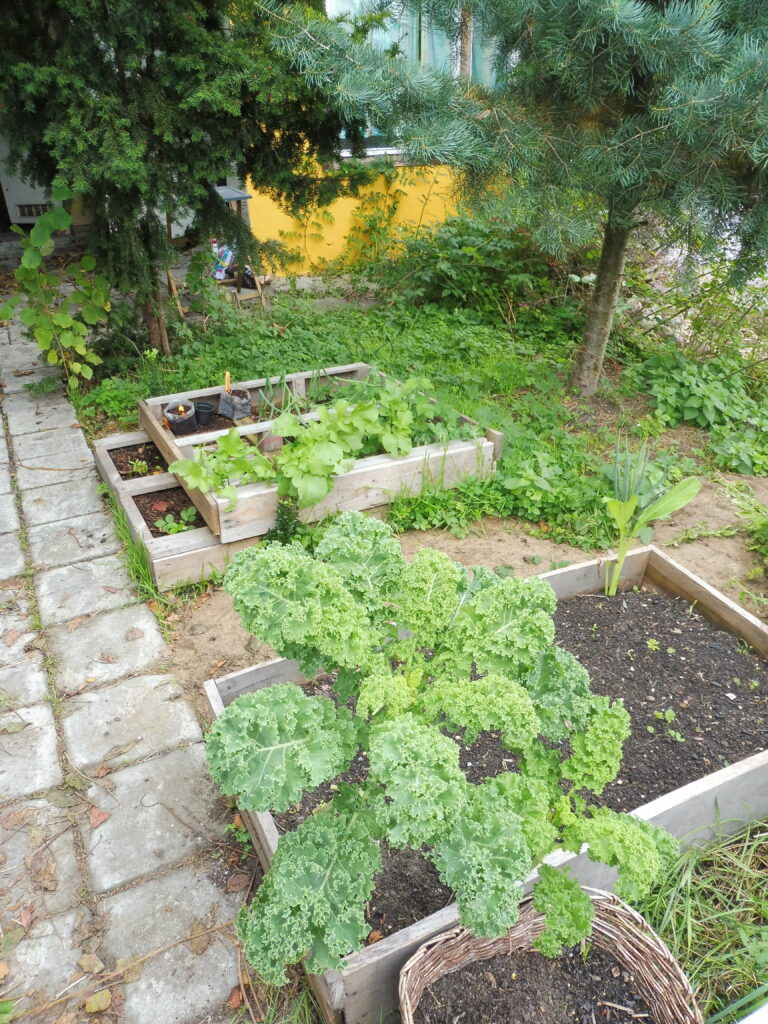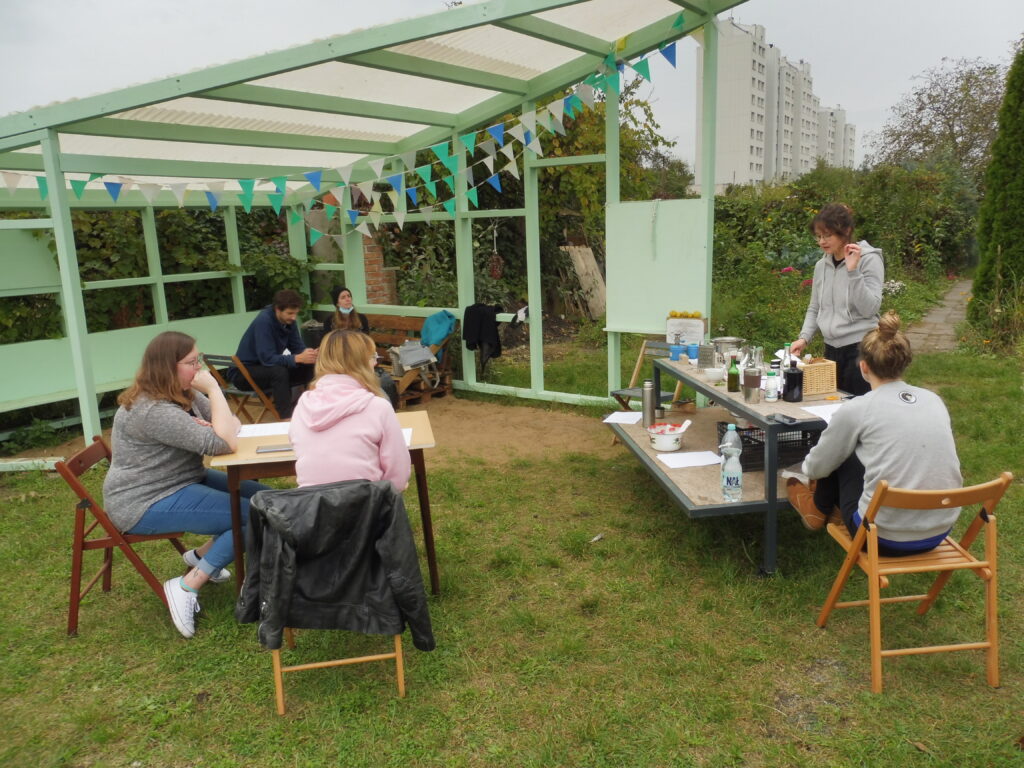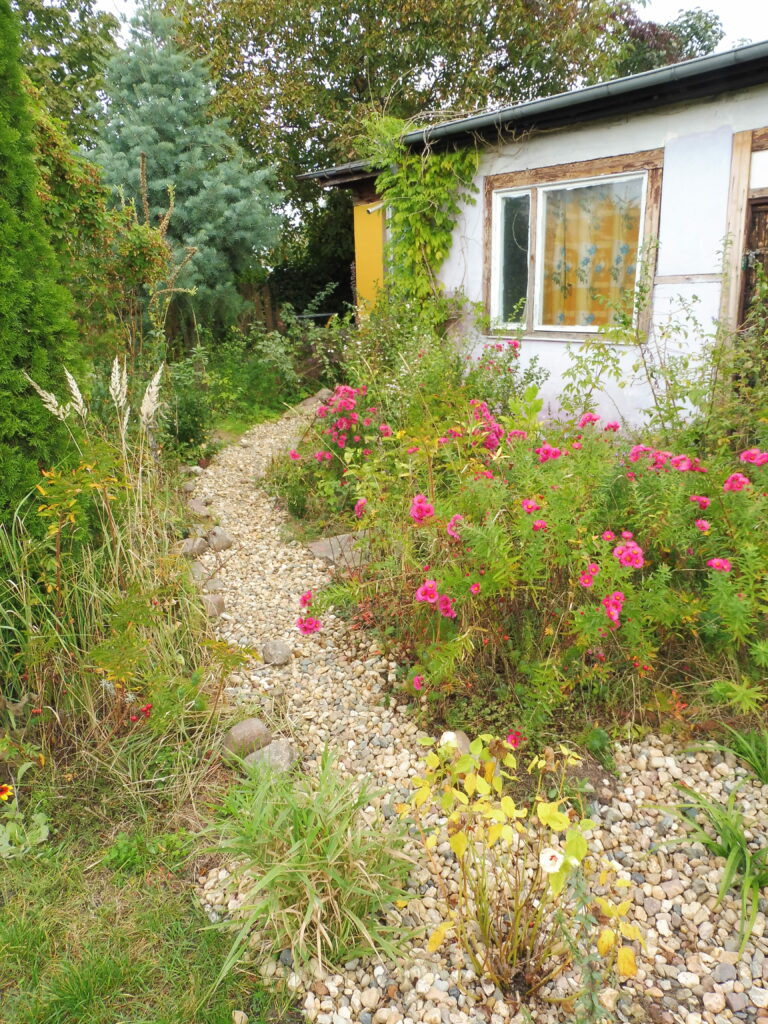An interview was held on 23.06.2020 by Anna Dańkowska with Yauheniya Chubarava and Bruno Zachariasiewicz from Plastformers Foundation who takes care of the Ołbiński Ogród Otwarty in the Wrocław allotment garden colony Lepsze Jutro.
Anna Dańkowska: The garden Ołbinski Ogród Otwarty (Ołbin Open Garden) started at the neighbouring allotment colony, not the one it is now in, right?
Yauheniya Chubarava: We moved it to Lepsze Jutro (“Better Tomorrow”) allotment garden colony, because we had got the area under walnut on Westerplatte allotment garden. So not much grows here, because the walnut shades a lot of space and harms other plants with juglone. And additionally it was a rather tiny plot. But originally the project started there. It was co-created as part of the Wrocław as European Capital of Culture 2016 micro-grants.
Ania: And that could help, right?
Bruno Zachariasiewicz: Yes. There was the threat that the city would give all the plots to the developers. But on the other hand there was social opposition, mainly from the allotment holders, but also from local people, like Albert, the co-creator of Ołbiński Ogród Otwarty.

Ania: What about the district council?
Bruno: The district council of Ołbin has really nice people. So there were these consultations – city and the inhabitants met, and then the city made such a promise: we don’t move the allotments, but they need to open up a little to the neighbours. And commit themselves to hold some events for the public. So this is how the idea of Ołbiński Ogród Otwarty was born. Albert wrote micro-grants project and won them, so this way there were also some money for initial animation activities.
Ania: It was already in 2017?
Bruno: Yes. Looking for a plot is always a long process. But on the other hand, there was this ultimatum from the city, that the colony should give some space for open activities. So finally at Westerplatte allotment garden colony, we got a small piece of land, a few people gathered there, cultural events took place, carpentry workshops. The garden hosted also a Secret Cinema. It was an neighbourhood integrating initiative, which meant projecting films in different “secret” locations in Ołbin, including private flats, for the inhabitants of the city. Maybe the board had expectations that there would be a lot of mass events, also controlled by them. But the group organising Ołbiński Ogród Otwarty wanted more autonomy. And then it moved to Lepsze Jutro allotment garden colony.
Ania: Did you get the plot as an informal group or as an association at Westerplatte?
Bruno: As an association, and they could use the land for free. And so can we as the Foundation Plastformers at the new location at Lepsze Jutro. The plot here is much bigger and appropriate for different kinds of activities. Also garden-wise we have more space for experiments.

Ania: How does it work with the Ołbiński Ogród Otwarty in Lepsze Jutro?
Yauheniya : All of what is happening at Lepsze Jutro with the community garden project is possible thanks to the wonderful garden’s management. They still have concerns because they do not know us, they have to gain trust. But it is slowly improving. Once the police came to the colony and there were assumptions that it was because of our common plot – even if it was not. So we need to clarify this with the management before we go on to other issues. E.g. we wanted to obtain the key to the club house in order to use the toilet there. The reaction was not positive, as the management was concerned about an access to all of the office. So our offer was to put a really good door, which would separate the office from the corridor leading to the toilet – this way the management would feel safer and we would have an access to the real toilet.
Bruno: Another issue is our compost toilet at our plot. People tend to think that it is a public one, to be used by all other allotment gardeners. And its capacity is not enough for so many people! It is not adapted as a public toilet. When more people are invited for the events, we rent a TOI TOI for it.
Ania: Can you describe the relations with the management?
Yauheniya: With the management it was a slow process to make them agree to have us run this common plot. In the beginning we had to come and get to know each other, then another time, step by step. Then we were allowed to start, we got the contract of renting the plot as the foundation. We also have a key to the gate, but we give it only to several “coordinators”, four persons at the moment. But even until now we don’t have the key to the gate which is just next to our plot. We are allowed to open only another one, a bit further away. So the management is still very cautious with the process of trusting us and letting us open the colony. But we have to be slow and cautious as not all of the gardeners are ready for it.
Ania: What have you managed to do in this first season on a new location?
Bruno: As we just started this year in this location and had to adapt the plot for our needs, we were investing more in cleaning the place, making it possible to be used. For this part it was harder to engage more people, it was a dirty, unattractive task! Then we were putting down the old shed. Thanks to the funding from Fund of Citizen Initiatives we can invest in creating new infrastructure. We build a new shed as part of the workshops organised.
Yauheniya: Due to pandemic it was hard to engage more people, but at least we invested in preparing a proper infrastructure. There surely will be better times for social part of this community garden.
Ania: How do you organise the community plot now?
Yauheniya: Now we have some people interested in coming regularly to the garden and we started to manage it strategically. We value these few persons much more then just occasional visitors, as they can take some responsibilities already. They can become familiar with the management, get their trust and become real care-takers of the garden. We settled duty hours for the garden and have shifts, they can here. With time probably we will need some regulations also. Until now it is based on trust.

Ania: What about gardening?
Bruno: We practice here permaculture gardening. We designed the garden using this attitude. As we said, gardening was not the main focus this season, as most of the activities were about infrastructure this year. But a kindergarden from nearby comes regularly to work in the garden.
Ania: How is the project developing?
Yauheniya: Now we are looking for more people to get involved and to feel, that it is their place as well. We have our own plot on another allotment garden colony, so we don’t need so much this one. We recently built a shelter and we want it to serve different people and groups. We would like the NGOs from the neighbourhood to feel welcome and to be able to use this place for their needs. We also organise a series of workshops, like DIY cosmetics.
Ania: I will come to this one for sure! Thank you for this interesting interview.
Bruno and Yauheniya : Thank you and see you at Ołbiński Ogród Otwarty!
The Ołbiński Ogród Otwarty developments can be follow on their funpage: https://www.facebook.com/OlbinskiOgrodOtwarty
